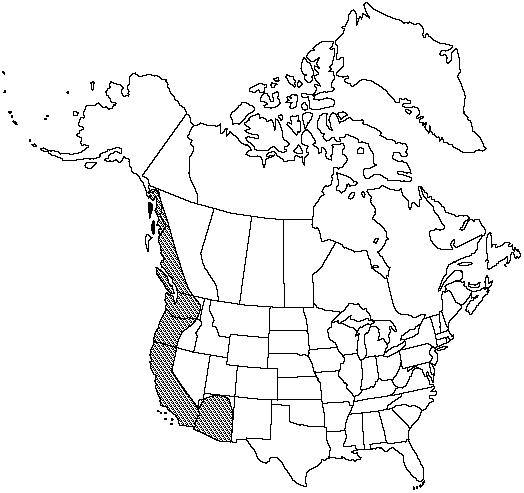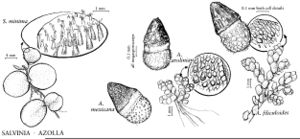Difference between revisions of "Azolla filiculoides"
in Lamarck et al.,Encycl. 1: 343. 1783.
FNA>Volume Importer |
FNA>Volume Importer |
||
| Line 23: | Line 23: | ||
|discussion=<p><i>Azolla filiculoides</i> is cold tolerant, surviving even in fragmented parts under thin ice. It usually reaches a climax population in late spring, becomes fertile, collapses, and is replaced by other more heat-tolerant aquatics such as <i>Lemna</i> spp. Hybrids between this species (male) and <i>A. microphylla</i> Kaulfuss (female), a species of Central America, South America, and the West Indies, have been reported (Do V. C. et al. 1989). V. M. Bates and E. T. Browne (1981) reported <i>A. filiculoides</i> from Georgia, far removed from its main range in western North America. The most likely explanation is that the plants represent escapes from horticulture.</p> | |discussion=<p><i>Azolla filiculoides</i> is cold tolerant, surviving even in fragmented parts under thin ice. It usually reaches a climax population in late spring, becomes fertile, collapses, and is replaced by other more heat-tolerant aquatics such as <i>Lemna</i> spp. Hybrids between this species (male) and <i>A. microphylla</i> Kaulfuss (female), a species of Central America, South America, and the West Indies, have been reported (Do V. C. et al. 1989). V. M. Bates and E. T. Browne (1981) reported <i>A. filiculoides</i> from Georgia, far removed from its main range in western North America. The most likely explanation is that the plants represent escapes from horticulture.</p> | ||
|tables= | |tables= | ||
| − | |references= | + | |references={{Treatment/Reference |
| + | |id=bates1981a | ||
| + | |text=Bates, V. M. and E. T. Browne. 1981. Azolla filiculoides new to the southeastern United States. Amer. Fern J. 71: 33--34. | ||
| + | }}{{Treatment/Reference | ||
| + | |id=duncan1940a | ||
| + | |text=Duncan, R. E. 1940. The cytology of sporangium development in Azolla filiculoides. Bull. Torrey Bot. Club 67: 391--412. | ||
| + | }} | ||
}}<!-- | }}<!-- | ||
| Line 38: | Line 44: | ||
|habitat=Stagnant and slow-moving waters. | |habitat=Stagnant and slow-moving waters. | ||
|distribution=B.C.;Ariz.;Calif.;Oreg.;Wash.;Mexico;Central America;Europe;ne Asia;s Africa;Pacific Islands in Hawaii. | |distribution=B.C.;Ariz.;Calif.;Oreg.;Wash.;Mexico;Central America;Europe;ne Asia;s Africa;Pacific Islands in Hawaii. | ||
| − | |reference= | + | |reference=bates1981a;duncan1940a |
|publication title=in Lamarck et al.,Encycl. | |publication title=in Lamarck et al.,Encycl. | ||
|publication year=1783 | |publication year=1783 | ||
|special status= | |special status= | ||
| − | |source xml=https://jpend@bitbucket.org/aafc-mbb/fna-data-curation.git/src/ | + | |source xml=https://jpend@bitbucket.org/aafc-mbb/fna-data-curation.git/src/f50eec43f223ca0e34566be0b046453a0960e173/coarse_grained_fna_xml/V2/V2_164.xml |
|genus=Azolla | |genus=Azolla | ||
|species=Azolla filiculoides | |species=Azolla filiculoides | ||
Revision as of 21:48, 16 December 2019
Plants green to yellowish green or dark red, with 2 growth stages; plants fertile only in mature stage, generally in late spring. Stems prostrate when immature, 1–3 cm, internodes elongate to 5 mm, becoming nearly erect to 5 cm or more when mature and crowded. Hairs on upper leaf lobes strictly unicellular. Megaspores warty with raised angular bumps, each with a tangle of filaments.
Habitat: Stagnant and slow-moving waters.
Distribution

B.C., Ariz., Calif., Oreg., Wash., Mexico, Central America, Europe, ne Asia, s Africa, Pacific Islands in Hawaii.
Discussion
Azolla filiculoides is cold tolerant, surviving even in fragmented parts under thin ice. It usually reaches a climax population in late spring, becomes fertile, collapses, and is replaced by other more heat-tolerant aquatics such as Lemna spp. Hybrids between this species (male) and A. microphylla Kaulfuss (female), a species of Central America, South America, and the West Indies, have been reported (Do V. C. et al. 1989). V. M. Bates and E. T. Browne (1981) reported A. filiculoides from Georgia, far removed from its main range in western North America. The most likely explanation is that the plants represent escapes from horticulture.
